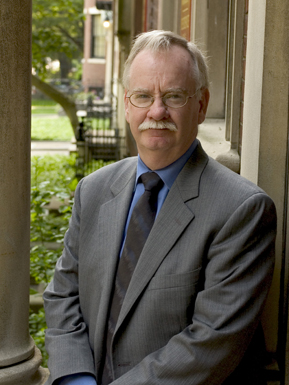BU Looks to Boost Aid, Cut Costs
Increased student need leads to review of operating expenses

Faced with an increase in financial aid applications at a time of decreasing revenues from the endowment and other sources, the University is looking to implement permanent cost-cutting measures that will keep BU focused on quality of students, faculty, and programs, President Robert A. Brown announced today.
“Our classroom and co-curricular educational programs are the most important components of what we do,” Brown says. “The quality and size of our faculty and teaching staff is key. Our plans for increased efficiency and cost reduction are designed not to impact these critical components.”
The University’s finances have been affected by the nationwide economic downturn this fall: the endowment dropped 24.1 percent, to $897 million, between June 30 and November 30, 2008, and, for planning purposes, up to a 30 percent decrease is being projected for the fiscal year ending in June 2009. The endowment only represents 4 percent of the University’s operating budget; however, this impact, combined with the potential for higher debt service expenses, and other cost increases, currently lead to a projected $10 million budget gap for the fiscal year that begins next July. In a letter sent to faculty and staff today, Brown said that the University leadership intends to balance the budget in the coming months, and emphasized that the first priority is maintaining BU’s quality while keeping it affordable and accessible to students and families. However, with mid-year financial aid applications up 41 percent over last year, Brown says that the administration “must prudently recognize the potential need for additional financial support for our students.”
“We expect the financial need of our students to continue to rise next year, and we are preparing for it by substantially increasing our financial aid reserve,” Brown says.
During December President Brown worked with the academic and administrative leadership of the University to study options for balancing the budget for the next fiscal year and the overall strategy for leading the University through the recession. The steps that are being undertaken were developed in collaboration with this group.
“Many of us came away with a strong commitment to work together to find ways to reduce expenses to resolve the shortfall without sacrificing educational programming or quality of life at the University,” says Gail Steketee, the dean of the School of Social Work and a participant in the planning process. “This is the positive side of stark economic times — with a forward-thinking management team, we can find sensible ways to cut costs, solve problems and end up a better, more integrated University for it.”
To provide more financial aid for Boston University students, and meet other projected expense increases, the University has already implemented a hiring freeze and held constant the salaries of employees earning more than $150,000. All capital expenditures for the fiscal years 2009 and 2010 will be reassessed to conserve cash. Current projects, including the Student Village II and the College of Fine Arts practice room project, will be completed; summer classroom and residential renovations, as well as the planned School of Law expansion, will be reviewed in the coming months.
The president also plans to review all of BU’s operating expenses to eliminate redundancies. Working groups have begun analysis of six service sectors — communication and Web-based publications, financial and administrative services, research administration, alumni relations, and event coordination — to look for possible reorganization strategies. The Office of the Provost has also initiated a review of subsidies provided to centers and institutes throughout the University.
"What drives us is a commitment to keep BU affordable to a wide and diverse group of students, both in the U.S. and around the world," says Laurie Pohl, the vice president for enrollment and student affairs.
The fiscal year 2010 budget currently includes modest salary increases for faculty — a measure that Brown says is justified because of the current “below market position” of faculty salaries. At this stage of the planning process, next year’s budget also includes a salary provision for current administrative employees. A salary freeze may be implemented “if economic conditions worsen,” Brown says.
The hiring freeze, implemented at the end of September 2008 to preemptively manage financial risks, will remain in effect until the structure of the reorganization is complete. The open staff positions will give the University some flexibility in reassigning staff to other assignments. Even with this flexibility, Brown says some layoffs will be “very likely.”
A town meeting, where faculty and staff can discuss the current state of the University and ask questions about the University’s budget and the steps outlined in Brown’s letter, is scheduled for Thursday, January 22, from 10 a.m. to 11 a.m., in the George Sherman Union’s Metcalf Hall; a video feed of the meeting will be shown in the Hiebert Lounge on the Medical Campus. Faculty and staff can register for the meeting at www.bu.edu/president/townmeeting/.
Comments & Discussion
Boston University moderates comments to facilitate an informed, substantive, civil conversation. Abusive, profane, self-promotional, misleading, incoherent or off-topic comments will be rejected. Moderators are staffed during regular business hours (EST) and can only accept comments written in English. Statistics or facts must include a citation or a link to the citation.